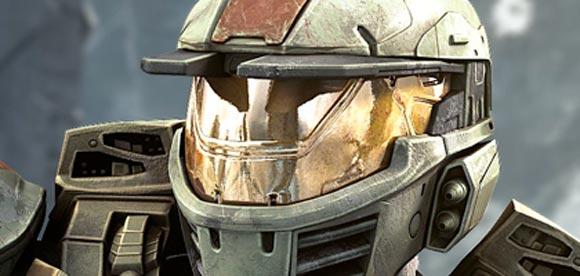Fortune Favours the Foolish
BTF #4 : Fortune Favours the Foolish
Beyond the Frontline is a regular feature where the staff here get up on the soapbox and put forward an idea or idea relating to Halo. Each BTF is a talking point designed to start a dialogue and unlike our regular word blasts and articles, the entries are short and sweet.
If you agree or disagree with any of the points raised we strongly encourage you to reply in the comments and be part of the conversation!
_______________________
Halo Wars is something of the redheaded stepchild at the Halo family reunion. That is, to render a tortured metaphor plain, it’s not as well loved as the rest. It’s not as character-driven as Reach (and seems to come with its own canon woes to boot), it’s not as beloved as Combat Evolved, or sprawling as Halo 2, or triumphant as Halo 3, or as atmospheric as ODST. To call it generic would be an insult, but there’s no doubting that as the lone RTS in the land of king shooters it sticks out awkwardly. It may be remembered in gaming history only as a footnote, a mention of streamlined controls for console RTS games, nothing more.

But we should raise a glass to it, and to the future, because Halo Wars proved Halo‘s enduring appeal. The game might have had the benefit of the Halo name, but it had to fight against a lot to succeed. Console RTS were notoriously mediocre. Ensemble realized in prototyping their own flavor for consoles that almost everything had to be thrown out and then readied carefully. Despite Halo‘s roots in a strategy game of its own, Ensemble had to reinvent the wheel.
And, improbably, they succeeded. The vast majority of gaming publications gave Halo Wars positive marks for its approach to console strategy and controls. While the game would never please die-hard fans on PCs, it certainly marked a rare success for RTS games on the console, and ended up selling somewhere north of one million units- an excellent number considering the genre and platform [1].
The numbers are all well and good, but the most important ingredient going forward is that Microsoft didn’t straightjacket Ensemble. In many ways they followed Bungie’s ethos of designing plot around gameplay–adding a bunch of unseen but very cool UNSC and Covenant ground vehicles and aircraft. But they also tied the expanded universe to the core game in a way Bungie was unwilling to do at the time–which made the experience far richer for lore fans, even though real-time strategy is notoriously bad for telling engaging stories [2].
The biggest thing to understand is that even with the Halo name, and the Ensemble pedigree, making Halo Wars was a risk. Its modest success doesn’t make it any less remarkable. And we should only hope that 343 Industries is willing to take similar chances. There’s only so many shooters you can make, and only so many ways you can tell stories within them. Branching Halo into different genres could be a major factor in its continued success.
Consider this: what if a Halo game was experienced from the perspective of your average Marine–no super-powered armor or shields, no floaty jumps, extreme damage from falls. Pit this character against the same amount of Covenant the Master Chief regularly slaughters–it becomes a matter of avoidance and kills of opportunity, emphasizing the stealth points that were mostly afterthoughts in previous Halo games. Instead of gunning down Elites like Rambo behind a .50 cal, players are forced to run in the face of large Covenant forces; being actively hunted is an entirely alien feeling for most Halo games. Moreover, the kind of story it tells is one of frailty, of weakness, and resolve far different than if players were inhabiting the shoes of a gunslinging alien-killing machine. Or what about a class-based multiplayer game, a la Star Wars Battlefront, that allowed players to assume the roles of Covenant or human troops in some of the most epic battles of the series (or even ones hereto only described and never seen?)
This isn’t a call for Microsoft to milk the franchise with meaningless spinoffs. Thus far, they have avoided the dangers of oversaturation and overcapitalizing on a good thing; if they weren’t protective of their franchise, HBO and NeoGAF denizens would be having debates about whether the Halo movie was about as bad or worse than Batman and Robin. Rather, they should be willing to take risks–to try out different gameplay formulas or genres, and constantly work towards the best Halo ever, and the ever-illusive goal of game and story perfection.
Dangerous Dave
Do you agree or disagree with us? Tell us what you think below in the comments. Feel free to check out other BTF entries here.
[1] Halo Wars Sales – Wired
[2] There’s Narrative in my RTS – Hellmode


Great read.
I personally love RTS like Company of Heroes, for example, and to me Halo Wars is held in the same regard, and is almost the same game just in the future.
In fact I play Wars quite often, mostly in offline Skirmishes. It’s just so satisfying to see a massive battle raging on screen.
Oh, and the cutscenes are gorgeous.
The cutscenes were definitely a highlight–especially since so much plot has to be relayed through cutscenes in an RTS.
Great suggestion for future titles; I would love to play as a hunter, brute and yes, even a grunt!
I do have to go off topic and ask when the next installment of the data pads from reach will be posted; I’ve been waiting all sumner for it!
Keep up the good work
Cool read. I think the Battlefron idea would be great–we could play a part in all those battles we’ve never seen before–or we could be in a real huge battle on Reach like the Tip of the Spear cutscene promised.